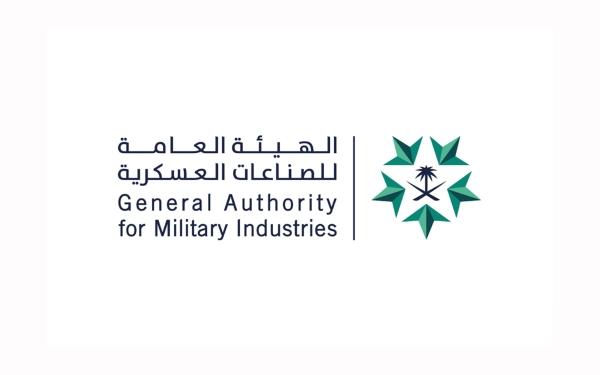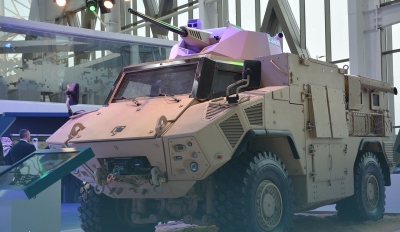

Localization of Military Industries in the Kingdom of Saudi Arabia refers to the Kingdom's ongoing efforts to localize the military industry sector. These efforts began early and have continuously evolved over decades, both in quantity and quality, culminating in the production of advanced military equipment and systems designed to meet the needs of the national defense sector. This includes the transfer of military technologies with substantial local content.
Beginning of military industries localization in the Kingdom
The localization of military industries in the Kingdom began during the reign of founding King Abdulaziz Bin Abdulrahman Al Saud in 1949, when a Royal Order was issued to establish the military factories in al-Kharj. The first step was taken the following year when the then-Minister of Defense, Prince Mansour Bin Abdulaziz, signed contracts to build the infrastructure for the military factories and provide the necessary equipment for an ammunition factory. In 1951, the foundation stone was laid, and King Saud Bin Abdulaziz inaugurated the military factories in 1954, marking the start of ammunition production.
Military industries development in Saudi Arabia
Early successes during the establishment of the General Authority for Military Industries (GAMI) led to building a base for military factories through long-term development plans, including expanding production to cover new types of munitions, bombs, and weapons. These plans also involved building the required infrastructure, such as maintenance workshops, educational centers, and essential facilities, ensuring a comfortable lifestyle for workers in the military factories, with access to housing, education, medical, and recreational services.
Key aspects of development include the implementation of a full localization plan and the training of workers in all production lines at military factories in 1970. In 1972, the contract for establishing the "G3" rifle factory was signed, and two years later, the Kingdom’s first weapons factory was opened, alongside an industrial training center under the patronage of King Faisal Bin Abdulaziz.
In 1977, the light ammunition factory was expanded and upgraded, and significant infrastructure projects were completed, including the construction of the General Administration building in al-Kharj, production and maintenance departments, warehouses, sports facilities, hospitality centers, hospitals, and the establishment of water, communication, transportation, desalination, and cooling systems.
In 1984, factories for hand grenades, twenty-mm aircraft ammunition, tool and spare parts production, and fuses were inaugurated. The following year, a secondary industrial institute was opened to train technical staff. In 1987, a factory for MP5 submachine guns and a revamped mortar bomb factory were inaugurated, as was an industrial research and development center. This was followed by the refurbishment and re-launch of an eighty-one-mm mortar bomb factory.
The collaboration between GAMI and the private sector led to the establishment of a military clothing and equipment factory in 1996, followed by an armored vehicle and heavy equipment factory the following year. In 1999, cooperation between GAMI and the Royal Saudi Air Force resulted in the establishment of a factory for twenty-five-lb aircraft training bombs.
In 2008, the secondary industrial institute, which originally accepted middle school graduates to supply technical personnel, was upgraded to a higher industrial institute, now limited to high school graduates. It was renamed Prince Sultan Industrial College, with the aim of training personnel to meet the needs of the military industry, in line with the development of production lines. Graduates are awarded an associate degree (technical diploma) in one of the available specializations, which include mechanical technology, electrical technology, electronic technology, and chemical technology. The following year, the production line for the "G36" rifle was inaugurated.
Strategic transformation of GAMI
In 1985, a supreme approval was issued, transforming the War Factories into GAMI, granting it independence and legal personality, along with a governing board. This shift aimed to prepare for a new phase characterized by flexibility in engaging with global military manufacturing sources, ensuring the localization of military industries while keeping pace with the latest global advancements. Additionally, it sought to establish technical frameworks for industrial integration with the national private sector, strengthening cooperation to benefit military industries and investing in the available capacities of private national industries to support and develop existing operations and introduce new ones.
Key developments during this phase included the establishment of the "MP5" submachine gun factory, nine mm, in 1987 and the "P7M13" pistol factory, nine mm, in 1990. Additionally, in 2012, the light ammunition factory was inaugurated, followed by the launch of the "G36" rifle factory and a women's division in the military clothing and equipment factory in 2014.
In 2013, foundation stones were laid for major projects such as the unmanned aerial vehicle drone project, military transport vehicles, and heavy artillery ammunition. That same year, a Council of Ministers decided to approve a new organizational structure, renaming it "GAMI".
GAMI objectives
GAMI aims to build a strong foundation for the military industry in the Kingdom, ensuring the establishment, growth, and development of military industries that align with scientific advancements on sound economic principles. It focuses on preparing local technical and administrative expertise to support this development, conducting research and studies relevant to its goals by creating specialized departments and collaborating with universities, research centers, and local and global experts.
GAMI also aims to establish both scientific and practical plans to guide national resources and human capabilities in the field of military industries. It seeks to meet the needs and requirements of the armed forces as well as other military sectors. Furthermore, it is focused on forming partnerships with international partners to transfer advanced technologies for military systems and laying the groundwork for research and development, with the goal of enhancing the effectiveness and efficiency of weaponry.
Establishment of GAMI
A decision by the Council of Ministers in 2017 led to the creation of GAMI, aiming to enhance national military manufacturing capabilities and localize the military industries sector, positioning it as a key contributor to the national economy. GAMI acts as the regulatory entity for the military industries sector, responsible for its organization, development, and oversight.
GAMI plays a vital role in supporting the defense sector by providing employment opportunities for Saudi youth, boosting non-oil revenue, and increasing its direct contribution to the Kingdom's gross domestic product by 2030. It also aims to strengthen the Kingdom’s military and security independence through the development of a local military and security industry. GAMI's target is to achieve over 50 percent localization of the Kingdom’s total military spending by 2030.
GAMI has established a comprehensive strategy aimed at empowering local manufacturers to support the sector’s goals. GAMI developed regulatory frameworks that allow foreign investors to enter the military industries market in the Kingdom, provided they participate in the localization and employment initiatives and contribute to the transfer of technology. GAMI calls on both local and international investors to contribute to this initiative. The investment environment in the sector is highly attractive and fertile, offering international investors the opportunity to own 100 percent of their investments locally. Investors can benefit from the Kingdom's economic strength by positioning themselves at the center of international supply chains. Its strategic geographical location, connecting three continents, makes it a promising investment destination.
In addition to setting policies, strategies, laws, and regulations related to the military industries sector, GAMI manages military procurement for Saudi military and security entities. It also issues manufacturing licenses for both public and private sectors, locally and internationally, and manages research, development, and education efforts in this critical sector. This includes budget allocation, technology transfer, project management, and collaboration with research centers and universities both within and outside the Kingdom. GAMI contributes to establishing new research centers and developing incentives to grow the military industries sector, as well as supporting local manufacturers to qualify them to achieve the strategic goal of localizing over 50 percent of military and security spending on equipment, military systems, maintenance services, and reforms by 2030.
Military industries licensing program
In 2019, GAMI launched the military industries licensing program, allowing for the licensing of activities related to military industries in the Kingdom. It began receiving applications for licenses in military manufacturing, the provision of military services, and the supply of military products or services.
GAMI established a mechanism for issuing licenses, identifying three main types of licenses for military activities: Military manufacturing licenses, military services licenses, and licenses for supplying military products or services. Each category covers six specific areas in the military industries sector: Firearms, ammunition, military explosives, military equipment, individual military gear, and military electronics.
Localization of interceptor missile launch platforms manufacturing
In 2022, GAMI approved two projects aimed at localizing the production of interceptor missile launch platforms and missile containers. These projects are part of the efforts to localize the Terminal High Altitude Area Defense (THAAD) system, in collaboration with Lockheed Martin Saudi Arabia Ltd. These projects align with GAMI's focus on national priorities in the military sector, enhancing the military and security readiness of the Kingdom's air defense system by continuing the path of localizing military industries.
Military industries sector indicators
The 2021 report on the military industries sector indicators in the Kingdom, published by GAMI, revealed a 41 percent increase in the number of licensed companies within the sector by the end of the first half of 2021. The total number of licensed companies reached ninety-nine local, international, and mixed ownership companies, with local companies accounting for 85 percent and fully international or mixed ownership representing 15 percent. Additionally, 60 percent of the licenses were issued to companies engaged in military manufacturing, followed by 24 percent in military services, and 16 percent in product supply.
Localization of the military industries sector
The military industries sector in the Kingdom has witnessed progress in localization efforts. Since its establishment, GAMI has spearheaded strategic projects and programs aimed at achieving national priorities. These initiatives include establishing legislation for military manufacturing contracts, supporting and enabling local manufacturers, and fostering the development of promising local companies. GAMI has also worked to support major national companies in enhancing their global presence. Among the key strategic projects is the empowerment of investors through the supply chains in the military industries sector, which offers over seventy targeted localization opportunities. A notable achievement is the launch of ad-Dahna' vehicle, a military armored vehicle manufactured and localized within the Kingdom.
Additionally, in collaboration with the Ministry of Defense, GAMI launched and localized the locally-manufactured "HSI32" fast interceptor boat, built to modern specifications and global standards through a partnership between the French company CMN Naval and Zamil Offshore. Moreover, GAMI announced a localization and capabilities development agreement between the Middle East Propulsion Company and U.S. company Honeywell. This agreement focuses on localizing the capabilities for the repair, maintenance, and overhaul of "AGT1500" engines.
GAMI announced a project aimed at empowering investors through the supply chains in the military industries sector in the Kingdom. This initiative is part of the Kingdom’s ongoing efforts to localize over 50 percent of government spending on military equipment and services by 2030. It aims to support and enable investors by offering numerous investment opportunities in the military industries' supply chains. GAMI identified seventy-four localization investment opportunities spanning six defense and security sectors. Additionally, GAMI launched the "Military Industries" platform to provide investors with access to localization opportunities and to connect them with licensed industrial capabilities in the sector. This platform facilitates connections between local and global companies, particularly original equipment manufacturers, enabling easier and quicker access to localization opportunities as they arise. The platform is accessible through the link: marketplace.gami.gov.sa.
In 2023, the third industrial city in Jeddah, affiliated with the Saudi Authority for Industrial Cities and Technology Zones, "MODON", witnessed the opening of Zahid Group’s first defense and security product localization factory, marking the group's first foray into the military industries sector in the Kingdom.
Establishment of the Saudi Arabian Military Industries "SAMI"
The Saudi Arabian Military Industries "SAMI" was founded in 2017 and is wholly owned by the Public Investment Fund (PIF). It is tasked with developing and supporting the defense industries in the Kingdom while boosting self-sufficiency. One of its main goals is to localize 50 percent of defense spending as part of Saudi Vision 2030’s objectives.
SAMI began its operations in January 2018, focusing on developing and enhancing national capabilities while aligning with future trends. The company provides services, products, and innovations that support the operational readiness of the Kingdom's armed forces. It is committed to delivering high-quality services to elevate the defense industry's sector and ensure the necessary supplies for its clients. Furthermore, SAMI aims to position itself among the top twenty-five defense companies globally by 2030.
Since its founding, SAMI has advanced to rank seventy-ninth among the top one hundred global defense companies, solidifying its status as a reliable partner to some of the world's leading defense product innovators and manufacturers.
SAMI's areas of focus span across multiple sectors, including aerospace, defense systems, advanced electronics, land systems, and naval systems.
Related quizzes
Related articles

